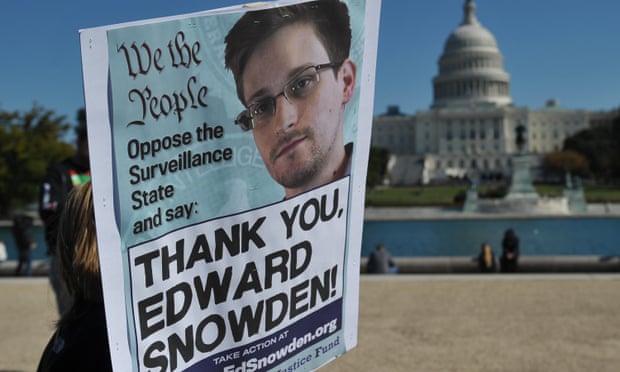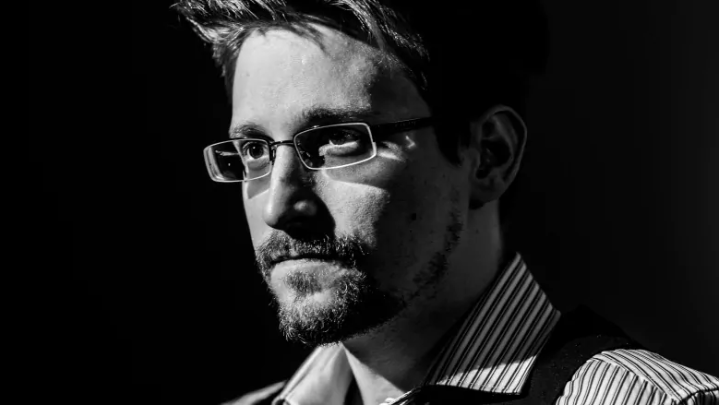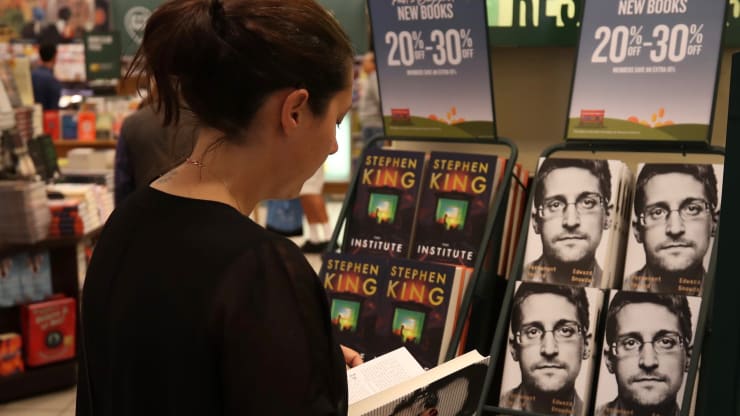This article is more than
8 year oldEdward Snowden makes 'moral' case for presidential pardon
Support the Guardian’s fearless, independent journalism by making a contribution or becoming a member
Edward Snowden has set out the case for Barack Obama granting him a pardon before the US president leaves office in January, arguing that the disclosure of the scale of surveillance by US and British intelligence agencies was not only morally right but had left citizens better off.
The US whistleblower’s comments, made in an interview with the Guardian, came as supporters, including his US lawyer, stepped up a campaign for a presidential pardon. Snowden is wanted in the US, where he is accused of violating the Espionage Act and faces at least 30 years in jail.
Speaking on Monday via a video link from Moscow, where he is in exile, Snowden said any evaluation of the consequences of his leak of tens of thousands of National Security Agency and GCHQ documents in 2013 would show clearly that people had benefited.
“Yes, there are laws on the books that say one thing, but that is perhaps why the pardon power exists – for the exceptions, for the things that may seem unlawful in letters on a page but when we look at them morally, when we look at them ethically, when we look at the results, it seems these were necessary things, these were vital things,” he said.
“I think when people look at the calculations of benefit, it is clear that in the wake of 2013 the laws of our nation changed. The [US] Congress, the courts and the president all changed their policies as a result of these disclosures. At the same time there has never been any public evidence that any individual came to harm as a result.”

Although US presidents have granted some surprising pardons when leaving office, the chances of Obama doing so seem remote, even though before he entered the White House he was a constitutional lawyer who often made the case for privacy and had warned about the dangers of mass surveillance.
Obama’s former attorney general Eric Holder, however, gave an unexpected boost to the campaign for a pardon in May when he said Snowden had performed a public service.
The campaign could receive a further lift from Oliver Stone’s film, Snowden, scheduled for release in the US on Friday. Over the weekend the director said he hoped the film would help shift opinion behind the whistleblower, and added his voice to the plea for a pardon.
Ahead of general release, the film will be shown in 700 cinemas across the US on Wednesday, with plans for Stone and Snowden to join in a discussion afterwards via a video link.
In his wide-ranging interview, Snowden insisted the net public benefit of the NSA leak was clear. “If not for these disclosures, if not for these revelations, we would be worse off,” he said.
In Hong Kong in June 2013, when he had passed his documents to journalists, Snowden displayed an almost unnatural calm, as if resigned to his fate. On Monday he said that at that time he expected a “dark end” in which he was either killed or jailed in the US.
More than three years on, he appears cheerful and relaxed. He has avoided the fate of fellow whistleblower Chelsea Manning, who is in solitary confinement in the US. Snowden is free to communicate with supporters and chats online late into the night.
His 2.3 million followers on Twitter give him a huge platform to express his views. He works on tools to try to help journalists. He is not restricted to Moscow and has travelled around Russia, and his family in the US have been to visit him.
But Snowden still wants to return to the US and seems confident, in spite of all the evidence to the contrary, that it will happen. “In the fullness of time, I think I will end up back home,” he said.
“Once the officials, who felt like they had to protect the programmes, their positions, their careers, have left government and we start looking at things from a more historical perspective, it will be pretty clear that this war on whistleblowers does not serve the interests of the United States; rather it harms them.”
Snowden attracts lots of conspiracy theories. Early on, he was accused of being a spy for China and then a Russian spy. In August a cryptic tweet followed by an unusual absence prompted speculation that he was dead. He said he had simply gone on holiday.
There had also been rumours that his partner, Lindsay Mills, had left him, which would have been embarrassing as their romance occupies a large part of the Stone film. Snowden said “she is with me and we are very happy”.The reports of my death are greatly exaggerated. pic.twitter.com/ZgIkapmcOC
— Edward Snowden (@Snowden) August 15, 2016
Read More (...)
Keywords
Newer articles
<p>Wang Yi tells Antony Blinken ‘disruptions’ could arise amid threat of sanctions over China’s support for Russia’s defence industry</p>
King’s Funeral Plans Dusted Off—as Health Remains a Mystery
Bill Maher's audience roars with laughter after he mocks Don Lemon to his face
Can Zendaya make the leap from tween idol to Hollywood heavyweight?
MAJOR ANNOUNCEMENT: Buck Palace updates on King Charles’ condition
What Weinstein Accusers Are Saying About the Shock Reversal
Biden just signed a potential TikTok ban into law. Here’s what happens next
Doja Cat steps onto red carpet in lingerie
Tiffany Haddish Says Common Is the Only Celebrity She's Been 'Entangled' With, Claims He Chased Her for 2 Years
US Congress threatens ICC over Israel arrest warrants



